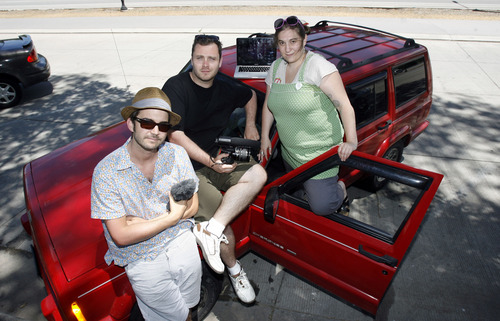This is an archived article that was published on sltrib.com in 2011, and information in the article may be outdated. It is provided only for personal research purposes and may not be reprinted.
On his application to get into journalism school at New York City's prestigious Columbia University, DW Gibson said he wanted to be the next Studs Terkel, whose Pulitzer Prize-winning career included "Working," an oral history of working people.
Gibson's doing it now, but with a different twist.
"Not Working" will be the title of the book he writes upon completing a cross-country road trip with boyhood friend MJ Sieber, who runs a theater company in Seattle. They are collaborating on a companion film about people they meet, all over this land, who have lost jobs in the Great Recession.
Part of the time, they will be accompanied by mutual friend and playwright Mallery Avidon. She already has contributed haikus on folks they've encountered in California and Nevada. One example: "Sandra's eye wilted/ Home Care Nurse one week notice/ She is fifty-six."
"To capture the human experience through the fulcrum of being fired" is how Gibson's publisher characterized the mission before the seven-week trek began June 19 in an Orange County, Calif., traffic jam. The journey reached Salt Lake City late Monday after scheduled stops in Fresno and Reno, and a detour to the middle-of-nowhere-Nevada gypsum-mining town of Empire, which is in the process of becoming a ghost town.
A couple of themes have emerged so far.
Age is an issue, unless you're 36 to 39. Outside of that narrow range, you've got problems.
"The people over 40 say they can't get anyone to pay attention to them because they're too old," Gibson said Tuesday. "And younger than that, they say people don't hire them because they don't have enough experience."
Avidon has been struck by the impact of job loss on self-esteem. "It's incredible what not working does to you, that sense of isolation. Even when [people] don't say it, you can see it in their faces."
The team has quickly realized the complexity of joblessness.
It generates its share of sad stories, such as that of the Laotian refugee the trio met at a church service in Fresno. She had been laid off from her job and was volunteering as an adviser to other immigrants from her country.
"What an uphill battle that is," Gibson observed.
There's also irony, such as the new father in Winnemucca, Nev., who had to ask his boss to fire him because he could support his young family better with unemployment benefits than a paycheck.
But there also are redemptive stories that illustrate how people rise to the occasion when confronted with a challenge. Sieber marvels at how "the younger community under 25 has an incredible ability to live within its means" even when money from a job is in short supply. "Life still functions."
And this is only one week into the expedition, which moves next to Cheyenne, Wyo. and then to Omaha, Neb.
"It's hard to explain the bubble we're living in now," Gibson said of the single-minded focus on people who have lost something so closely tied to their identities. "It doesn't shut off. It's so intense and relentless."
At the same time, these interactions are ideal for adrenaline junkies seeking the new and different. As Sieber asked Gibson the other day: "How long has it been since you were so excited about people?"
Twitter: @sltribmikeg —
Follow their trip
O The "Not Working" team's progress can be tracked.
> americanotworking.com —
Studs Terkel (1912-2008)
• Received 1985 Pulitzer Prize in general nonfiction for "The Good War: An Oral History of World War Two"
• In 1974, he published "Working — People Talk About What They Do All Day and How They Feel About What They Do."
• He got his start during the Great Depression with the renowned Federal Writers' Project, which included Logan native and poet May Swenson, John Steinbeck, Saul Bellow and Ralph Ellison.



